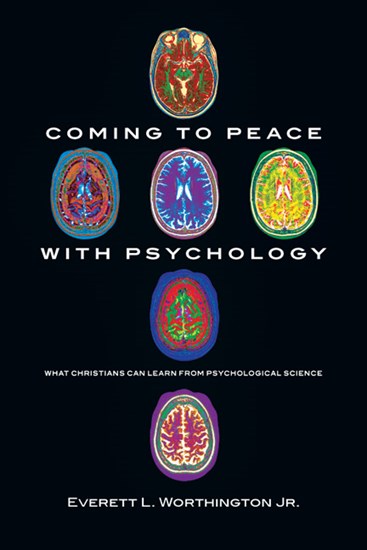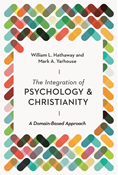
|
Coming to Peace with Psychology
paperback
|
- Length: 304 pages
- Dimensions: 6 × 9 in
- Published: July 23, 2010
- Imprint: IVP Academic
- Item Code: 3882
- ISBN: 9780830838820
-
Other Retailers:
Amazon*
*affiliate partner
Religion and science have often been at odds. In particular, Christianity and psychology have not always gotten along. Some Christians are still suspicious of psychological findings. But researcher Everett Worthington argues that Christians can know people better--and even know God better--through psychological science.
Worthington suggests that the relationship between psychological science and Christianity is less like a war or mere dialogue and more like an emerging marriage. In this relational model of psychology and Christianity, there may be marital spats at times but also great potential for an intimate, mutually fulfilling relationship.
Worthington demonstrates how the tools of experimental psychology shed light on human nature and the nature of God. Because people bear the image of God, the findings of psychological science help us understand both people and God more clearly. Psychological science provides new perspectives on theology and can help us address theological controversies and hot topics. Worthington gives recent examples of illuminating psychological findings, examines the distortions of the image of God through the effects of sin and points to ways that psychology assists Christians in living more virtuously.
Psychology can contribute to the Christian life, because all of us, psychologists and non-psychologists alike, are human and can benefit from better understanding our fellow humankind. Beyond integrating Christian and psychological truths, this book uncovers new relationships between science and religion, demonstrates psychology?s benefits to theology, and helps Christians live a redeemed life that is pleasing to God.
"Few evangelicals have impacted contemporary psychology more than Everett Worthington. That alone makes the publication of his understanding of the relation between psychological science and Christian theology an important event. Suggesting that the relation is analogous to a marriage relationship and a dance, he argues for both their relative independence and the necessity that they be deeply engaged with and committed to each other. There is much to debate in this book, but the author's love of God, people and psychological science is evident throughout."
"Everett Worthington is a significant scholar and researcher in the field of psychology who presents in this book a thoughtful and personal view of the relationship between psychology and Christian faith. In a winsome and irenic style, he argues for a relational partnership between theology and psychology that neither simplistically pits the fields in a struggle for authority, nor inappropriately intermingles their concepts and ideas. Most importantly, Worthington argues for the value of psychological research in this very important conversation about theological and psychological views of the nature of persons."
"This is psychology for the intelligent Christian! Worthington turns integration into a dance with full participation from the science of psychology and genuine faith. Culturally relevant and full of the most cutting-edge psychological research, Worthington is true to both his faith and science. To those that struggle with reconciling theology and psychology, this book is a faithful guide with genuine respect for both disciplines. Communicated with a readable style a beginning student could appreciate. All previous books on integration will need to be rewritten to respond to Worthington's ideas."
"Everett Worthington--accomplished psychological scientist, biblically rooted person of faith and professional writer--is the perfect person to assist Christians in coming to peace with today's psychology. With his conversational voice and dry wit, he introduces us to startling findings, differing perspectives, and evidence-based insights on faith and faithful living. Highly recommended!"
"This book will make you think! Everett Worthington is one of the most intelligent and influential Christians involved in scientific psychology. Coming to Peace with Psychology may not put you at peace with every dimension of psychology and theology, but it will definitely deepen your perspective and provoke you to consider ways that the science of psychology can enrich our understanding of God."
"Past discussions of how psychology and theology are related have tended to be written either from the perspective of psychotherapists and counselors or from that of psychological scientists. In a remarkably well-informed, wide-ranging review of the literature, Everett Worthington argues that 'we are wise to look at all sources of information and wisdom we have at our disposal--and this includes both Scripture and psychological science.' This outstanding book is an invaluable, up-to-date reference source on issues at the interface of psychology and Christian belief."
CONTENTS
Acknowledgments
Introduction
Part I: The Relationship of Psychological Science to Theology
1 Interesting Things About People
2 A Tale of Two Cities
3 What Information Can I Trust?
4 Why You Might Not Believe What You Don?t Already Believe
5 The Methods of Disciplines
6 A Relational Model
7 Understanding the Relational Partners
8 Dealing with Some Challenges
Part II: What Psychological Science Has to Offer Theology
9 Psychological Science Provides a New Tool
10 Psychological Science Is Limited
11 Psychological Science Strengthens Theological Claims
12 Psychological Science Adds New Ideas to Theology
13 Psychological Science Addresses Theologically Hot Social Controversies
14 Psychological Science Helps Us Understand Virtuous Living
15 Psychological Science Helps Us Live More Virtuously
16 Can Psychological Science Help Us Know God Better?
Notes
Author Index
Subject Index













